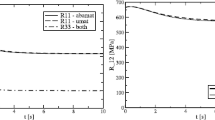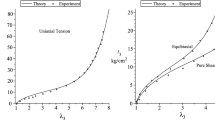Abstract
A general explicit formula for the maximum recoverable work from a given state is derived in the frequency domain for full tensorial isothermal linear viscoelastic constitutive equations. A variational approach, developed for the scalar case, is here generalized by virtue of certain factorizability properties of positive-definite matrices. The resultant formula suggests how to characterize the state in the sense of Noll in the frequency domain. The property that the maximum recoverable work represents the minimum free energy according to both Graffi's and Coleman-Owen's definitions is used to obtain an explicit formula for the minimum free energy. Detailed expressions are presented for particular types of relaxation function.
Similar content being viewed by others
References
S. Breuer and E.T. Onat, On the maximum recoverable work in linear viscoelasticity, Z. Angew. Math. Phys. 15 (1964) 12-21.
S. Breuer and E.T. Onat, On the determination of free energy in linear viscoelasticity, Z. Angew. Math. Phys. 15 (1964) 184-191.
B.D. Coleman, Thermodynamics of materials with memory, Arch. Rational Mech. Anal. 17 (1964) 1-45.
B.D. Coleman and V.J. Mizel, Norms and semi-groups in the theory of fading memory, Arch. Rational Mech. Anal. 23 (1967) 87-123.
B.D. Coleman and V.J. Mizel, On the general theory of fading memory, Arch. Rational Mech. Anal. 29 (1968) 18-31.
B.D. Coleman and D.R. Owen, A mathematical foundation for thermodynamics, Arch. Rational Mech. Anal. 54 (1974) 1-104.
W.A. Day, Reversibility, recoverable work and free energy in linear viscoelasticity, Quart. J. Mech. Appl. Math. 23 (1970) 1-15.
G. Del Piero and L. Deseri, Monotonic, completely monotonic and exponential relaxation functions in linear viscoelasticity, Quart. Appl. Math. 53 (1995) 273-300.
G. Del Piero and L. Deseri, On the analytic expression of the free energy in linear viscoelasticity, J. Elasticity 43 (1996) 247-278.
G. Del Piero and L. Deseri, On the concepts of state and free energy in linear viscoelasticity, Arch. Rational Mech. Anal. 138 (1997) 1-35.
E.H. Dill, Simple materials with fading memory, Continuum Physics II. A.C. Eringen (ed.), Academic Press, New York (1975).
M. Fabrizio, Existence and uniqueness results for viscoelastic materials, Crack and Contact Problems for Viscoelastic Bodies, G.A.C. Graham and J.R. Walton (eds), Springer-Verlag, Vienna (1995).
M. Fabrizio, C. Giorgi and A. Morro, Free energies and dissipation properties for systems with memory, Arch. Rational Mech. Anal. 125 (1994) 341-373.
M. Fabrizio, C. Giorgi and A. Morro, Internal dissipation, relaxation property, and free energy in materials with fading memory, J. Elasticity 40 (1995) 107-122.
M. Fabrizio and A. Morro, Viscoelastic relaxation functions compatible with thermodynamics, J. Elasticity 19 (1988) 63-75.
M. Fabrizio and A. Morro, Mathematical Problems in Linear Viscoelasticity, SIAM, Philadelphia (1992).
I.C. Gohberg and M.G. Krein, Systems of integral equations on a half-line with kernels depending on the difference of arguments, Am. Math. Soc. Transl. Ser. 2 14 (1960) 217-287.
J.M. Golden, Free energies in the frequency domain: the scalar case, Quart. Appl. Math. to appear.
D. Graffi, Sull'espressione dell'energia libera nei materiali viscoelastici lineari, Ann. di Mat. Pura e Appl. (IV) 98 (1974) 273-279.
D. Graffi, Sull'espressione analitica di alcune grandezze termodinamiche nei materiali con memoria, Rend. Sem. Mat. Univ. Padova 68 (1982) 17-29.
D. Graffi, Ancora sull'espressione analitica dell'energia libera nei materiali con memoria, Atti Acc. Scienze Torino 120 (1986) 111-124.
D. Graffi and M. Fabrizio, Sulla nozione di stato materiali viscoelastici di tipo 'rate', Atti Accad. Naz. Lincei 83 (1990) 201-208.
M.E. Gurtin and I. Herrera, On dissipation inequalities and linear viscoelasticity, Quarth. Appl. Math. 23 (1965) 235-245.
P.R. Halmos, Finite-dimensional Vector Spaces, Springer-Verlag, New York (1972).
A.N. Kolmogorov and S.V. Fomin, Introductory Real Analysis, Dover Publications Inc. (1975).
A. Morro, Wave solutions in linear viscoelastic materials, Crack and Contact Problems for Viscoelastic Materials, G.A.C. Graham and J.R. Walton (eds), Springer-Verlag, Vienna (1995).
A. Morro and M. Vianello, Minimal and maximal free energy for materials with memory, Boll. Un. Mat. Ital. 4A (1990) 45-55.
N.I. Muskhelishvili, Singular Integral Equations, Noordhoff, Groningen (1953).
W. Noll, A new mathematical theory of simple materials, Arch. Rational Mech. Anal. 48 (1972) 1-50.
I.N. Sneddon, The Use of Integral Transforms, McGraw-Hill, New York (1972).
G. Talenti, Sulle equazioni integrali di Wiener-Hopf, Boll. U.M.I. 7(4), Suppl. Fasc. 1 (1973) 18-118.
E.C. Titchmarsh, Introduction to the Theory of Fourier Integrals, Clarendon, Oxford (1937).
V. Volterra, Energia nei fenomeni elastici ereditari, Acta Pontificia Accad. Scient. 4 (1940) 115-128.
Author information
Authors and Affiliations
Rights and permissions
About this article
Cite this article
Deseri, L., Gentili, G. & Golden, M. An Explicit Formula for the Minimum Free Energy in Linear Viscoelasticity. Journal of Elasticity 54, 141–185 (1999). https://doi.org/10.1023/A:1007646017347
Issue Date:
DOI: https://doi.org/10.1023/A:1007646017347




